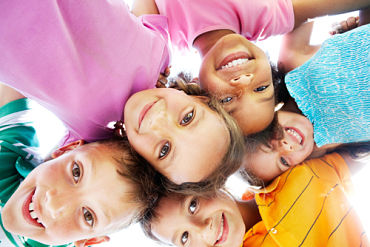
A group of children huddled up with their heads pressed together all looking down together
Children's Eye Health & Safety
Your child can develop eye issues and not even realize it. If you notice your child is having problems with learning or their grades dropping for no apparent reason, you might check for some of the following symptoms:Rubbing of the eye a lot, squinting or blinking more than usual,
complaining of headaches due to eye strain, tilting their head to one side,
covering one eye to see better, holding book closer to see or can't remember what they read.
You may also see the following change in their eyes:
Bulging eyes
Redness in the eyes
Gray or cloudy center in the eye, pus or drainage from the eye
Rapid movement
Constant watering
If you notice any of these symptoms, please seek medical attention for your child.
The most common eye problems are blurred vision, crossed eyes and lazy eyes. A regular eye exam can detect this in the early stages. Children age 3 and up should get an eye exam every 1-2 years. Vision screenings are done at school and will catch the basic problems with children. But it can't diagnose them. That is why it is important to get regular eye exams.
If your child fails an eye exam, glasses are probably needed. For toddlers, you are better off choosing plastic frames with an elastic strap. They are more durable and won't be as easily lost. Older kids can choose their own, but make sure they have springs hinges. This will help with the longevity of the glasses. Contacts should probably not be worn until a child is around 10 or so. Most kids aren't mature enough to put their contacts in their eye or keep them clean until then. Vision correction surgery isn't advised for growing kids. A child with glasses should have a yearly exam.
Kids with lazy eye will usually get a patch put on their good eye or drops to blur the good eye. This helps train the brain to use the weak eye to see with. If you child plays sports, well fitted, protective eyewear is very important. You will want a frame made of tough material that won't break. Also consider sunglasses if you child is playing an outdoor sport. This is to help protect your child's eyes from the harmful ultraviolet light they are exposed to. Your eye doctor should be able to help with this step.
If you child injures their eye, treat it right away. Don't let them rub it. That can scratch it. If something is in it, flip the upper eyelid over the lashes and ask them to blink several times. Flush the eye with clean water. If it doesn't come out, go to your local emergency room. Also seek ER treatment if your child gets hit in the eye, has a chemical thrown or splashed in his eye or if they are hit in the eye.
If you have any questions about your child's eye care, contact your local eye doctor or one of the physicians at Sabetha Family Practice at (785) 284-2141.
